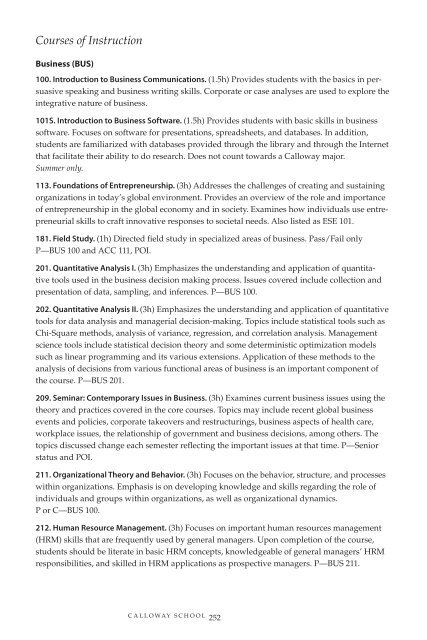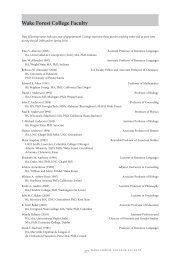theundergraduateschoo ls - Wake Forest University
theundergraduateschoo ls - Wake Forest University
theundergraduateschoo ls - Wake Forest University
Create successful ePaper yourself
Turn your PDF publications into a flip-book with our unique Google optimized e-Paper software.
Courses of Instruction<br />
Business (BUS)<br />
100. Introduction to Business Communications. (1.5h) Provides students with the basics in persuasive<br />
speaking and business writing skil<strong>ls</strong>. Corporate or case analyses are used to explore the<br />
integrative nature of business.<br />
101S. Introduction to Business Software. (1.5h) Provides students with basic skil<strong>ls</strong> in business<br />
software. Focuses on software for presentations, spreadsheets, and databases. In addition,<br />
students are familiarized with databases provided through the library and through the Internet<br />
that facilitate their ability to do research. Does not count towards a Calloway major.<br />
Summer only.<br />
113. Foundations of Entrepreneurship. (3h) Addresses the challenges of creating and sustaining<br />
organizations in today’s global environment. Provides an overview of the role and importance<br />
of entrepreneurship in the global economy and in society. Examines how individua<strong>ls</strong> use entrepreneurial<br />
skil<strong>ls</strong> to craft innovative responses to societal needs. A<strong>ls</strong>o listed as ESE 101.<br />
181. Field Study. (1h) Directed field study in specialized areas of business. Pass/Fail only<br />
P—BUS 100 and ACC 111, POI.<br />
201. Quantitative Analysis I. (3h) Emphasizes the understanding and application of quantitative<br />
too<strong>ls</strong> used in the business decision making process. Issues covered include collection and<br />
presentation of data, sampling, and inferences. P—BUS 100.<br />
202. Quantitative Analysis II. (3h) Emphasizes the understanding and application of quantitative<br />
too<strong>ls</strong> for data analysis and managerial decision-making. Topics include statistical too<strong>ls</strong> such as<br />
Chi-Square methods, analysis of variance, regression, and correlation analysis. Management<br />
science too<strong>ls</strong> include statistical decision theory and some deterministic optimization mode<strong>ls</strong><br />
such as linear programming and its various extensions. Application of these methods to the<br />
analysis of decisions from various functional areas of business is an important component of<br />
the course. P—BUS 201.<br />
209. Seminar: Contemporary Issues in Business. (3h) Examines current business issues using the<br />
theory and practices covered in the core courses. Topics may include recent global business<br />
events and policies, corporate takeovers and restructurings, business aspects of health care,<br />
workplace issues, the relationship of government and business decisions, among others. The<br />
topics discussed change each semester reflecting the important issues at that time. P—Senior<br />
status and POI.<br />
211. Organizational Theory and Behavior. (3h) Focuses on the behavior, structure, and processes<br />
within organizations. Emphasis is on developing knowledge and skil<strong>ls</strong> regarding the role of<br />
individua<strong>ls</strong> and groups within organizations, as well as organizational dynamics.<br />
P or C—BUS 100.<br />
212. Human Resource Management. (3h) Focuses on important human resources management<br />
(HRM) skil<strong>ls</strong> that are frequently used by general managers. Upon completion of the course,<br />
students should be literate in basic HRM concepts, knowledgeable of general managers’ HRM<br />
responsibilities, and skilled in HRM applications as prospective managers. P—BUS 211.<br />
C A L L O WAY S C H O O L 252






